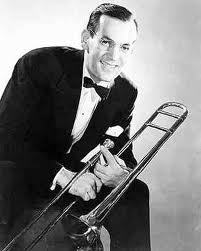Glenn Miller
Glenn Miller
 Alton Glenn Miller was born on March 1, 1904 and came to be known as one of the best “Big Bands” of the swing era during the 1940s. As early as 1931, the Nathaniel Shilkret payroll archives show that Miller played on two radio broadcasts – one, sponsored by the Smith Brothers and another on the Chesterfield Quarter Hour show called “Music That Satisfies.”
Alton Glenn Miller was born on March 1, 1904 and came to be known as one of the best “Big Bands” of the swing era during the 1940s. As early as 1931, the Nathaniel Shilkret payroll archives show that Miller played on two radio broadcasts – one, sponsored by the Smith Brothers and another on the Chesterfield Quarter Hour show called “Music That Satisfies.”
Miller’s other radio stints included Band Remotes, a program that featured popular music during the beginnings of the big band era from 1935 to 1950. The show was broadcast in hotels, restaurants, dance halls, Army camps and ballrooms and was usually unrestrained, letting the leaders play without commercial interruptions.
Even though Miller had created his orchestra in 1937, he struggled with success until he played at the Glen Island Casino and the NBC “Band Remotes” show brought him to the radio microphone. Miller was soon engaged in eight or ten radio broadcasts per week and by 1940, he’d signed with Chesterfield who put him on CBS for a nightly run. After that significant boost to his career, Glenn Miller’s orchestra catapulted to became the nation’s top band.
Miller was known for his standoffish demeanor and this unnerved the men in his orchestra. But, Miller was a perfectionist who demanded perfections for those who worked for him and that was largely what took him up the ladder past the other bands during that time.
Miller was originally a trombonist who didn’t quite become equal with Tommy Dorsey or Jack Teagarden, but his specialty was that he could arrange music and find the players who could produce the sound he wanted. His success was phenomenal – when anyone mentions “swing” or “big bands,” Miller’s orchestra comes to mind.
Glenn Miller replaced the Paul Whiteman Orchestra on Chesterfield Time, also known as Moonlight Serenade, and featured the Andrew Sisters as repeat performers on the show. Marion Hutton and Ray Eberle were also featured as top singers of the era. This show was the platform where Miller introduced the medley, “something old, something new, something borrowed something blue.”
At the pinnacle of his career, Miller decided to join the war effort, but at 38 years of age he was told he was too old. Miller wrote to General Charles Young and asked him to persuade the Army to accept him and put him in charge of an Army band. The rest is history. Miller was accepted and began a whole new musical career in the Army Air Force as a Captain. His last show for Chesterfield before joining the army was aired on 24th September 1942 and can be heard on RUSC today.
On December 15, 1944, Miller boarded a plane to take him from the United Kingdom to Paris to play for the soldiers. The plane disappeared over the English Channel and no trace of the crew, passengers or plane was ever found. Glenn Miller was listed as “missing in action.”
Happy listening my friends,
